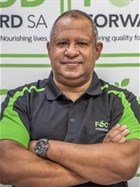
Top stories






RetailSuperga’s century of style: Celebrating 100 years of the iconic 2750 classic
Crick Group 7 Apr 2025
More news

Marketing & Media
#BehindtheSelfie: Adriana Woolridge, marketing manager at Homemation
Karabo Ledwaba 2 days















The recent Daily Maverick article about children in Bushbuckridge in Mpumalanga having to “take turns to eat” because their families are struggling to put food on the table, is heart wrenching but sadly, not surprising, and indicative of what thousands of households in under-served communities across the length and breadth of our country experience daily – in both rural and urban settings.
The article, published in March, highlighted that the average household income is R19,200; that the child support grant is too low to meet basic nutritional needs; and nearly eight million children in South Africa live below the food poverty line.
A 2022 study by Wits University on household food insecurity and coping strategies found that 20% of households in South Africa lack access to sufficient food and that this prevalence varies widely across the nine provinces. The report notes that some of the coping strategies of food insecure households include consuming less expensive foods, borrowing or using credit, relying on relatives or friends, limiting portion sizes, and even begging for food.
To better understand how the current cost of living and high food prices are affecting households, we visited the homes of people who regularly access cooked meals from local community kitchens that are supported by FoodForward SA’s network. We asked them questions related to income levels, how long their income lasts, what types of food they purchase, and how often they access food from their local community kitchen. The feedback gleaned from these interviews confirm the experiences of households in Bushbuckridge, highlighting some concerning trends. To protect their anonymity, only first names are used.
Nomathemba is 65 years old. She lives in a one-room shack which she shares with her son and five grandchildren. Her son is unemployed. The grandchildren are all still in school.
“My children are all far away, trying to find work, but some I have not heard from in years,” she says.
Nomathemba receives a social grant for herself, as well as child support grants for three grandchildren.
“I always buy maize meal, vegetables, rice and sugar when I get my grant money. But the money does not last for more than two weeks and we run out of food. I have to borrow money from loan sharks to buy food,” she says.
Nomathemba and her family access food from a local community kitchen supported by FoodForward SA: “The food we get from the community kitchen is a lifesaver for me and my grandchildren. I don’t know what we would do without them.”

Bongane is 60 years old. He lives in a one-room shack by himself. There is no electricity. He receives a social grant, but the money does not last for two weeks. He moved to Cape Town two years ago from the Eastern Cape to find work. He has not been very successful in securing employment but does some odd jobs at a local creche, for which he receives R100 per month. When he receives his social grant, he buys maize meal, bread, cabbage, potatoes and sometimes pilchards. He regularly accesses food from a local community kitchen supported by FoodForward SA. When they dish his portion of food, he keeps some food for supper.
“Most days I have nothing to eat and no money to buy food. The food from the community kitchen helps me a lot,” says Bongane.
Phumla, who is one of the co-founders of a community kitchen NPO that they started in 2017, and also a beneficiary of FoodForward SA, had this to say: “We feed more than 700 people every day. Many of the people who rely on us face extreme poverty, are unemployed, and for many, the meals we provide are their only source of food. I would like to say a big thank you to FoodForward SA for their incredible support, because I cannot do this without FoodForward SA.”
Food and nutrition insecurity are critically neglected public health issues in our country, which adversely affects human health and well-being, with damaging consequences. Millions of households are struggling to put food on the table and simply can’t afford to buy nutritious food. Close to 29% of our children under five years of age are malnourished, because they do not have access to the proper nutrition they need to grow and develop.
FoodForward SA works with a range of farmers, manufacturers, and retailers, to timeously recover within date, edible surplus food, which in turn supports a network of 2,519 registered and vetted beneficiary organisations reaching 935,000 food insecure people across the country, at a cost per meal of just R0,50. This model ensures that we can increase access to food in under-served communities, while significantly reducing the environmental impact of food waste.
